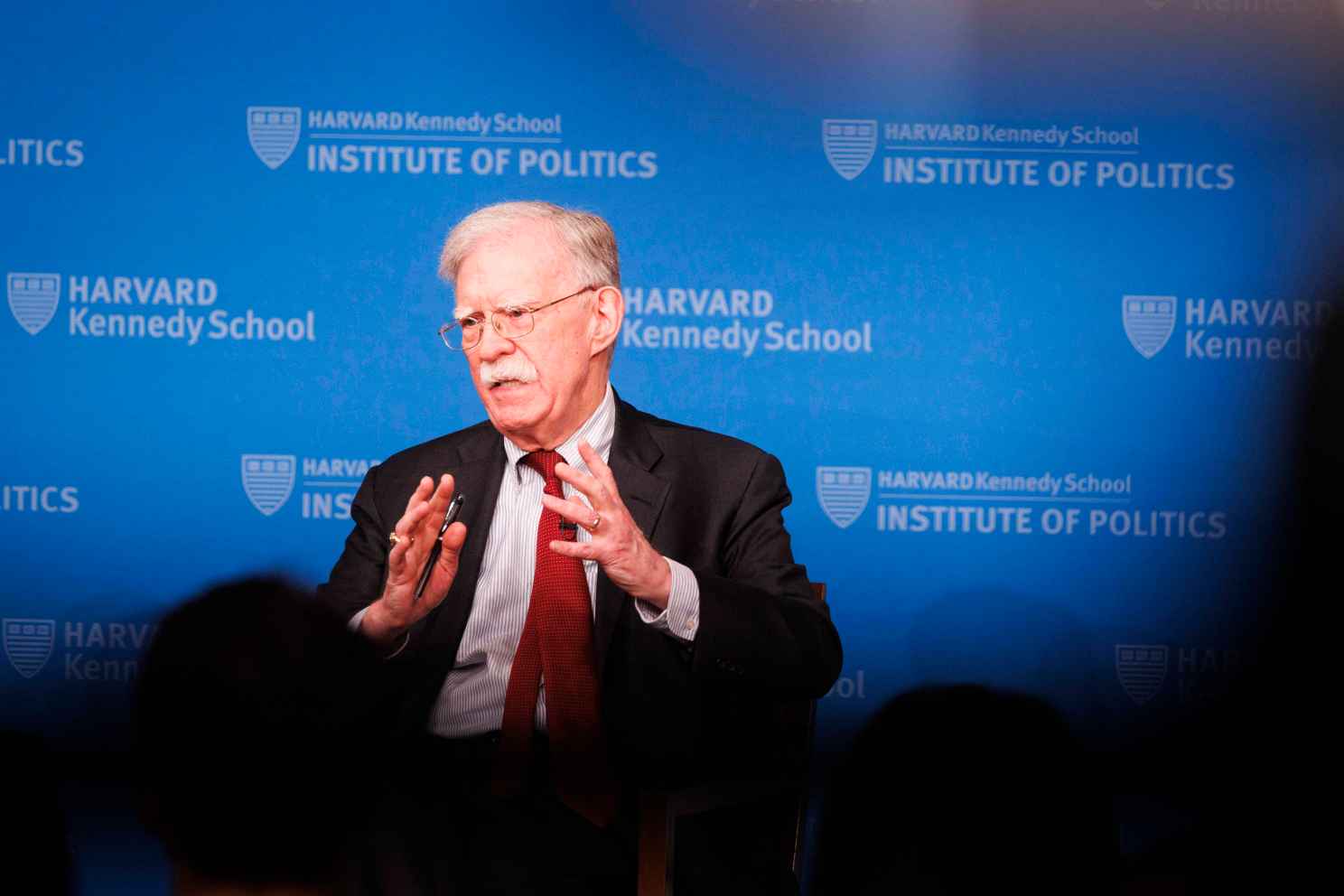U.S. just didn’t get China, Bolton says

U.S. just didn’t get China, Bolton says
Asian nation now main economic, military threat to Western democracies, according to former national security adviser
The U.S. got it wrong on China.
China now is seen as the main threat to Western democracies over the coming decades “and I don’t think we’re prepared for it on a number of levels,” said John Bolton, former national security adviser to President Trump during his first term.
During a conversation about U.S. national security at Harvard Kennedy School on Monday evening, Bolton said the U.S. “badly misunderstood” how China’s economic growth and rising influence would affect global politics, and mistakenly believed the rise of a middle class would prompt the nation to become more democratic.
“We were wrong on both accounts,” said Bolton, who also served as an acting United Nations ambassador during the George W. Bush administration.
“China’s development of a nuclear striking capability close to or equal to Russia and the United States, I think, is the gravest threat to world peace this century.”
John Bolton
Instead, President Xi Jinping has emerged as the most powerful leader of China since Mao and China could become a nuclear peer with the U.S. and Russia by 2030, maybe sooner. The addition of a third nuclear superpower could destabilize the delicate balance achieved by the U.S. and Russia after decades of talks and agreements over arms control and deterrence.
“China’s development of a nuclear striking capability close to or equal to Russia and the United States, I think, is the gravest threat to world peace this century,” Bolton told Ned Price, an adviser to former Secretary of State Antony Blinken and State Department spokesperson during the Biden administration. Price is currently a fall fellow at the Institute of Politics.
The U.S. should be very concerned about the emerging partnership between Russia, China, North Korea, and Iran, especially a China-Russia “axis” where China is the dominant partner over Russia, Bolton said.
Despite its denials, China has aided Russia in the war in Ukraine by buying more Russian oil, helping launder sanctioned Russian financial assets, and providing weapons in parts that can then be reassembled, Bolton said.
By the end of this century, he predicted, Eastern Russia will likely become Chinese territory.
Unfortunately, the top priority for the U.S. during Trump’s first term was to secure a big trade deal with China, and others, like Japan, rather than broader considerations such as national security or human rights.
“The bigger strategic picture was lost,” Bolton said.
“The bigger strategic picture was lost.”
John Bolton
Bolton was highly skeptical that there will ever be a Palestinian state, and drily mocked Trump’s declaration during a White House press event earlier in the day of a Gaza peace plan to end the nearly two-year war between Israel and Hamas and his appointment of former U.K. Prime Minister Tony Blair to oversee post-war Gaza.
“I don’t think what was announced today is going to happen,” because Hamas and Iran are unlikely to agree to the terms outlined by the White House, said Bolton, who rebuked the United Nations Relief and Works Agency (UNRWA) for having “mistreated” Palestinian refugees for decades and called for the agency’s elimination.
Though still a critic of the U.N. and other “soft power” efforts like USAID, Bolton took aim at recent cuts to Voice of America, Radio Free Europe, and other U.S. government-funded news outlets. Many around the world relied on them for news about the U.S., “and now they’re gone. That is a huge vacuum that we’ve created for our adversaries to fill,” he said. “It was a huge mistake.”
Bolton pushed back on detractors who say regime change is his default foreign policy strategy, saying there are only two viable options to deal with adversaries or rogue nations.
“You either see if you can change their behavior or if you can’t change their behavior, change the regime,” he said.
Latest Harvard
- Time for mandatory retirement ages for lawmakers, judges, presidents?Americans seem to mostly say yes; legal, medical scholars point to complexities of setting limits
- In dogs, as in humans, a harsh past might bare its teethEarly adversity leads to higher aggression and fearfulness in adult canines, study says
- Brief bursts of wisdomAphorism lover and historian James Geary reflects on how ancient literary art form fits into age of social media
- Flew home as Will Flintoft, returned as Rhodes ScholarApplied math concentrator to study computer science, theology with eye toward AI
- What will AI mean for humanity?Scholars from range of disciplines see red flags, possibilities ahead
- Tai Tsun Wu, 90Memorial Minute — Faculty of Arts and Sciences






